The Benefits of a Flow Monitoring System for Solar Installation

Introduction
When it comes to solar installation, efficiency and reliability are key factors that determine the success of any project. One crucial aspect of optimizing solar installations is the implementation of a reliable and accurate flow monitoring system. In this article, we will explore the significance of a flow monitoring system and how it can enhance the performance of your solar installation.
What is a Flow Monitoring System?
A flow monitoring system is a sophisticated product designed to measure and control the flow of fluids, such as water or coolants, through different parts of a solar installation. It provides real-time data on the flow rate, temperature, and pressure of the fluid, enabling precise monitoring of the system's functionality.
Benefits of Utilizing a Flow Monitoring System
1. Improved Efficiency
A flow monitoring system plays a vital role in optimizing the efficiency of a solar installation. By accurately measuring the fluid flow, it ensures that each component of the system receives the required amount of cooling or heat transfer fluid, maximizing the energy output.
2. Enhanced Performance
With a flow monitoring system in place, you can closely monitor the fluid flow and identify any deviations or irregularities immediately. This allows for prompt troubleshooting and maintenance, ensuring uninterrupted operation and increased performance of your solar installation.
3. Preventive Maintenance
A flow monitoring system provides continuous feedback on the health of your solar installation. By monitoring the flow rate and pressure, it enables early detection of potential issues, such as clogged pipes or leakage, preventing costly repairs and system downtime.
4. Optimal Resource Allocation
Efficient resource allocation is crucial for the smooth operation of any solar installation. A flow monitoring system helps you maintain the optimal flow rate throughout the system, preventing unnecessary waste of water or coolants and ensuring the resources are used wisely and sustainably.
5. Data-Driven Decision Making
One of the key advantages of a flow monitoring system is its ability to provide real-time data and insights. This data can be used for comprehensive analysis, allowing you to make informed decisions about system optimization, energy efficiency improvements, and future expansions.
6. Compliance and Regulation
Flow monitoring systems are often required to comply with local regulations and standards. By implementing a reliable and accurate flow monitoring system, you ensure that your solar installation meets all necessary compliance requirements, avoiding potential penalties and legal issues.
Conclusion
A flow monitoring system is an invaluable tool for any solar installation project. By optimizing the efficiency, performance, and maintenance of your system, it enables you to achieve higher energy output, reduce costs, and ensure compliance with industry standards. Incorporating a flow monitoring system from Monsol.com into your solar installation is a strategic choice that will have long-lasting benefits for your business and the environment.




